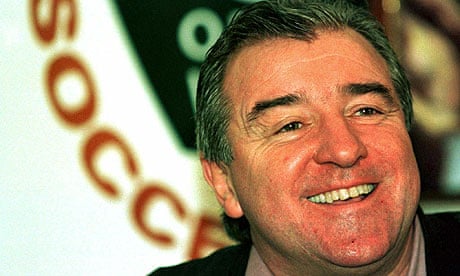"Managers are always complaining about the transfer window," writes Steve Arthurs. "But why have we got one in the first place?"
The story of the transfer window is the story of a flip-flop by the English elite – the Premier League was initially the driving force behind the idea of a transfer window, but by the time it was introduced it was firmly in the "no" camp. In short, the transfer windows were introduced in order to prevent the complete dismantling of the transfer system, though their origins lie in loftier ambitions.
Let's go all the way back to 1991-92 when the idea was first put to the vote in the top flight. The vote, on the principle of the transfer window, was narrowly defeated because of "one or two smaller clubs who sometimes need to sell in the season and were worried about having to do most of their buying in the summer when their cash flow was poor".
By December 1992 the idea was being bigged up by the Premier League powers that be. "Several high-profile managers and senior officials, notably Tottenham's Terry Venables, are in favour of copying Italy's hugely admired Serie A," reported Russell Thomas in the Guardian, "and closing shop for the whole season except for a 'transfer window' of a fortnight or three weeks in December or January." Rick Parry, then the Premier League chief executive, added: "Terry's idea is that managers ought to be coaches, spending time with their players and not looking around for new signings or fending off agents or having to deal with unsettled players." (Roberto Mancini would be able to point out just how well that latter theory has worked in practice.)
Parry argued that a transfer window would ultimately improve the quality of play on the pitch in England – "That has to be the objective of the Premier League" – but he seems to have failed to convince the smaller clubs of the case as the phrase "transfer window" isn't uttered again in the hallowed pages of the Guardian archive until 1998. Martin Thorpe reported on 30 January of that year: "The Premier League is considering revolutionary changes, including the introduction of a transfer window, foreign referees officiating in the Premier League and even a referee in each half of the pitch."
This time, though, the suggestion came not from Venables and co but from an Athens meeting of the nine top leagues in Europe – England, Germany, Italy, France, Spain, Holland, Portugal and (how times change) Belgium and Scotland. Essentially this group set themselves up to ensure their voice, and not just that of the national FAs, was heard by Uefa (the background threat of a breakaway league not least bending Uefa's ear). The driving force now was standardisation across Europe and, again, keeping those pesky agents on a leash. "It would keep some control over the agents just hawking players around constantly," said Peter Leaver, 1998's Premier League chief executive, "and I think clubs would also have to start planning ahead properly. I think it would make a lot of sense."
Uefa was in favour. "We have to introduce a European-wide system to stop the confusion that has followed Bosman," said the general secretary Gerhard Aigner in January 1998. By February 1999 negotiations seemed to have moved little, although Leaver and the Premier League remained very much in favour. Still the obsession seems to have been the power of agents. "We have put the idea forward ourselves," said the then head of the League Managers Association, John Barnwell. "It is a good way of curbing the power of players and agents who know they would not be able to move for a specified period."
Leaver added: "There is feeling we need harmony throughout Europe to ensure fair play and it's something we will continue to discuss."
Finally, in September 1999, Uefa announced plans for a standardised transfer window running for six weeks from mid-December to the end of January, though the issue of agents wasn't the key one in Uefa's thinking. The general secretary Gerhard Aigner insisted a common window was crucial to stop clubs from augmenting their squads in mid-competition. "The benefits are obvious," he said. "One is that a team starting a competition will stay together for at least part of it."
England and Germany united in opposition, with the length of the winter window a sticking point. Leaver's dismissal in March 1999 had considerably shifted the Premier League's position.
Then in the summer of 2000 the process was handed the mother of all jump-starts from the European Commission. Under pressure to scrap the entire transfer system (which was accused of breaching the Treaty of Rome), Fifa put forward a three-point compromise package to stave off the impending dismantling, one prong of which was the introduction of transfer windows, essentially designed to curb to some extent the post-Bosman freedom enjoyed by players (other proposals included one-season contracts for all players and compensation for players aged under 24).
By mid-October a biannual transfer window had been agreed by all the European countries apart from England in order to keep the transfer system intact and in March 2001 the European Commission agreed to the proposals. So by 2001 things had turned full circle, with Uefa now urging the Premier League to accept the new transfer rules.
Eventually the system we know today was introduced in 2002-03. "The English clubs did not want it, they were very happy with the existing system but, due to no fault of our own, we have had thrust upon us a new system which makes life more difficult," said the Arsenal vice-chairman David Dein in August 2002. "We were robustly opposed to it but were advised by Uefa that we had to comply and we have no alternative but to comply against our will." A very different position to the one taken by the Premier League's big beasts back in the 1990s.
USELESS UNBEATEN RECORDS
"At present, Liverpool's home league record reads P11 W4 D7 L0, so that despite being unbeaten 11 home league games they have only 19 points for an average of 1.72 points per game," writes Mike Taylor. "Has any team finished a league season with a less impressive unbeaten record?"
Step forward Como. "In Serie A in 1984-85 the newly promoted Como managed to finish their 15 home games with a record of W5 D10 L0 and a goal tally of F8 A2," writes Giovanni Meloni, which came as a consequence of their nine goalless home draws. Even so, at a time when wins were worth only two points they managed to avoid relegation by a three-point margin."
UNITED'S CUP WOES
"Manchester United are out of the Champions League, the FA Cup and the League Cup," sympathises Andrew Hatfield. "How many times have they been dumped out of three cup competitions by the end of January?"
This is only the second time this has happened to United, Andrew. The first came in 1980-81, the last season of Dave Sexton's miserable reign. United were beaten 1-0 home and away by Coventry in the second round of the League Cup; then, on 1 October, Widzew Lodz put them out of the Uefa Cup on away goals. United reached the fourth round of the FA Cup after beating Brighton in a replay but a 1-0 defeat at Nottingham Forest on 24 January ended their FA Cup campaign – and their season: in those days there was no Europa League consolation, and no title challenge.
The only other time United came close to a hat-trick of cup failures before the end of January was in 1977-78, again under Sexton. Having been knocked out of the League Cup and Cup Winners' Cup before Christmas, they lost an FA Cup fourth-round replay at West Brom on 1 February.
KNOWLEDGE ARCHIVE
"Bursaspor became only the fifth team to win the Turkish League at the weekend," wrote Ian South in 2010. "Has any other European League had so few different winners?"
Bursaspor's win in Turkey this season indeed ended one of Europe's longest standing quadopolies. Galatasaray, Besiktas, Fenerbahce and Trabzonspor were the only previous teams to have won the Turkish Super Lig but Bursa's victory draws Turkey level in the fewest champions stakes with Portugal, where Porto, Benfica, Sporting, Belenenses and Boavista are the only champions. Although it can be argued that the real leagues to beat in this regard are the still fairly fledgling ones of Eastern Europe (Latvia and Ukraine, for example, have had just three champions each but have been going for only 18 and 19 years respectively).
Turkey 5 (Galatasaray, Besiktas, Fenerbahce, Trabzonspor, Bursaspor)
Portugal 5 (Porto, Benfica, Sporting, Belenenses, Boavista)
Greece 6 (Olympiakos, Panathinaikos, AEK Athens, Aris Salonika, PAOK Salonika, Larissa)
Iceland 9 (KR, Valur, IA, Fram, Vikingur, FH, Keflavik, IBV, KA)*
Malta 10 (Sliema Wanderers, Floriana, Valletta, Hibernians, Hamrun Spartans, Birkirkara, Rabat Ajax, King's Own Malta Regiment, Marsaxlokk, St George's)
Scotland 11 (Celtic, Hearts, Rangers, Hibs, Third Lanark, Motherwell, Aberdeen, Kilmarnock, Dundee United, Dundee, Dumbarton)
* UBK added their name to the list later in the 2010
For thousands more questions and answers take a trip through the Knowledge archive
Can you help?
"The Oscar nominations on Monday reminded me of Neil Patterson, who won an academy award for best adapted screenplay for 'Room at the Top' in 1959," writes William Dods. "Patterson had previously captained Dundee United in the 1930s. Ignoring OBE/MBEs and the like are there any other footballers with major awards in a non-sporting field?"
"During the Norwich vs. Chelsea game at the weekend, neither side committed a foul in the opening 45 mins," writes Kristian Boyce. "Has any top flight games ever gone foul free for the whole match?"
"With the transfer window wide open, I was wondering if a player transferred mid-season has played more than the maximum number of league games in the same division that season?" writes Simon Goodenough. "ie, a player playing 47 league games in a 24-team league."
"After Tuesday night's handcuff-to-post efforts at Goodison Park, what are the most ludicrous on-pitch, non-match protests ever?" asks James Richards.
Send your questions and answers to knowledge@theguardian.com




